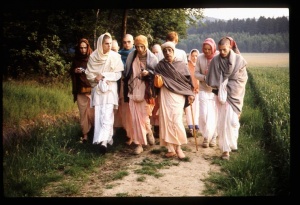SB 1.8.14

A.C. Bhaktivedanta Swami Prabhupada
TEXT 14
antaḥsthaḥ sarva-bhūtānām
ātmā yogeśvaro hariḥ
sva-māyayāvṛṇod garbhaṁ
vairāṭyāḥ kuru-tantave
SYNONYMS
antaḥsthaḥ—being within; sarva—all; bhūtānām—of the living beings; ātmā—soul; yoga-īśvaraḥ—the Lord of all mysticism; hariḥ—the Supreme Lord; sva-māyayā—by the personal energy; āvṛṇot—covered; garbham—embryo; vairāṭyāḥ—of Uttarā; kuru-tantave—for the progeny of Mahārāja Kuru.
TRANSLATION
The Lord of supreme mysticism, Śrī Kṛṣṇa, resides within everyone's heart as the Paramātmā. As such, just to protect the progeny of the Kuru dynasty, He covered the embryo of Uttarā by His personal energy.
PURPORT
The Lord of supreme mysticism can simultaneously reside within everyone's heart, or even within the atoms, by His Paramātmā feature, His plenary portion. Therefore, from within the body of Uttarā He covered the embryo to save Mahārāja Parīkṣit and protect the progeny of Mahārāja Kuru, of whom King Pāṇḍu was also a descendant. Both the sons of Dhṛtarāṣṭra and those of Pāṇḍu belonged to the same dynasty of Mahārāja Kuru; therefore both of them were generally known as Kurus. But when there were differences between the two families, the sons of Dhṛtarāṣṭra were known as Kurus whereas the sons of Pāṇḍu were known as Pāṇḍavas. Since the sons and grandsons of Dhṛtarāṣṭra were all killed in the Battle of Kurukṣetra, the last son of the dynasty is designated as the son of the Kurus.